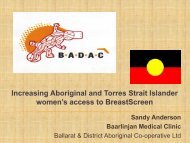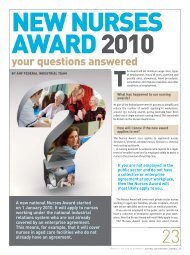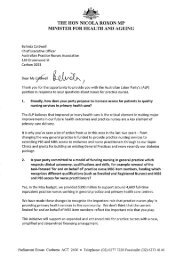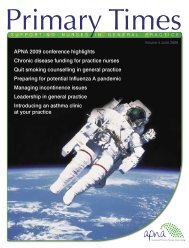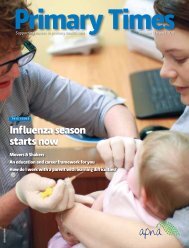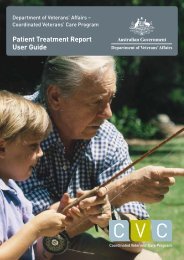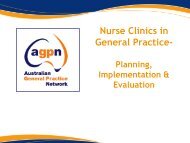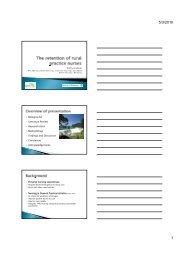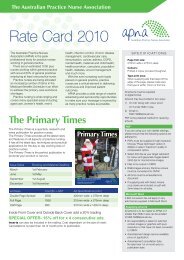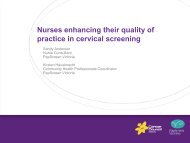September - APNA
September - APNA
September - APNA
You also want an ePaper? Increase the reach of your titles
YUMPU automatically turns print PDFs into web optimized ePapers that Google loves.
NEWS<br />
Early success for HPV<br />
vaccination program<br />
Australia is the first country to rollout a human papillomavirus (HPV) immunisation program, and has achieved a high level of coverage<br />
across the catch-up cohorts of 12 to 26-year-olds. Two new studies suggest that the impact of the program is already being felt.<br />
When the national program commenced, the<br />
Federal Government funded a two-year<br />
catch-up program to cover 13 to 18-year-old girls,<br />
with vaccinations delivered through schools, as<br />
well as 18 to 26-year-old women, who received<br />
vaccinations through general practice and<br />
community-based programs.<br />
The Gardasil HPV vaccine works by preventing<br />
the transmission the four main cancer-causing<br />
strains of the HPV — two of which cause cervical<br />
cancer and two which cause genital warts. The<br />
vaccine is the most effective when it is given before<br />
sexual activity begins and exposure to HPV occurs.<br />
A recent study carried out by The University<br />
of New South Wales National Centre in HIV<br />
Epidemiology and Clinical Research showed<br />
that rates of new genital wart infections have<br />
significantly dropped by 60% in women under<br />
27 years of age since the program was launched<br />
in mid-2007.<br />
The data also showed a 30% reduction in new<br />
genital warts cases in heterosexual men, which<br />
researchers have attributed to reductions in<br />
transmission from their partners — herd immunity<br />
benefits. (Herd immunity theory suggests that, in<br />
diseases passed from person to person, it is more<br />
difficult to maintain a chain of infection when large<br />
numbers of a population are immune.)<br />
In another recent study, Victorian Cytology<br />
Services demonstrated the world’s first drop in<br />
precancerous lesions since the introduction of an<br />
HPV vaccination program. The study showed the<br />
number of cases of high grade cervical lesions has<br />
fallen in women aged less than 20 years, suggesting<br />
that the program is starting to reduce the<br />
burden of cervical cancer.<br />
Without the high level of coverage achieved in<br />
the catch-up program these reductions in warts<br />
and cervical abnormalities would not have been<br />
realised as early they have been.<br />
As a group we should all take great pride in our<br />
role in the success of the program. Practice nurses<br />
played a significant role targeting 18 to 26-yearold<br />
women to participate in the HPV vaccination<br />
program and getting them back for second and<br />
third doses. We are aware of many of the efforts<br />
in actively recalling and opportunistically<br />
vaccinating eligible women and many <strong>APNA</strong><br />
members have been awarded for initiatives they<br />
have put in place to support the HPV vaccination<br />
program. It is fantastic to see the impact of the<br />
program already being demonstrated.<br />
<strong>APNA</strong> Best Practice Nurse Awards now open<br />
The Australian Practice Nurses Association is<br />
proud to announce that nominations for the<br />
2010 <strong>APNA</strong> Best Practice Nurse Awards are<br />
now open! With five award categories, the<br />
<strong>APNA</strong> Best Practice Nurse Awards aim to<br />
recognise and reward outstanding nurses<br />
working in general practice.<br />
In 2010 five awards are on offer, with prizes of<br />
$5,000 for each winner to use in enhancing<br />
their continuing professional development.<br />
Previous recipients have used their monetary<br />
prize to undertake work experience and education<br />
in both local and international locations.<br />
When considering whether to nominate,<br />
remember that while what you do in your practice<br />
might seem normal to you, it may be novel or new<br />
to someone else. Please refer the 2009 Best<br />
Practice Nurse Awards page on the <strong>APNA</strong> website<br />
to read examples of what the past Best Practice<br />
Nurse Award winners had done in their practices.<br />
Nominations for the Best Practice Nurse Awards will close at 5.00 p.m. on Friday, 14 January 2011,<br />
so make sure you send your nomination in soon!<br />
Visit www.apna.asn.au then click through to ‘Best Practice Nurse Awards’ under the Events tab.<br />
The categories open for nomination are:<br />
Sponsor<br />
Award Category<br />
CSL Biotherapies Best Practice Nurse Award for Immunisation<br />
TENA Best Practice Nurse Award for Continence Care<br />
MSD Best Practice Nurse Award for Chronic Disease Management<br />
Royal Australian College of General Practitioners Quality Care<br />
Musculoskeletal Best Practice Nurse Award<br />
Pfizer Best Practice Nurse Award for Innovation<br />
AGPAL Best Practice Nurse Award for Quality Improvement<br />
8<br />
Primary Times <strong>September</strong> 2010



